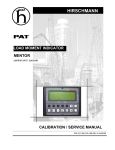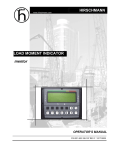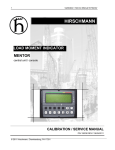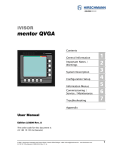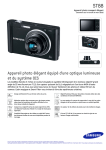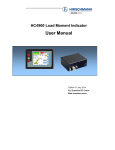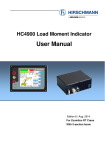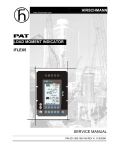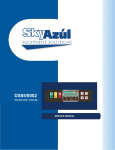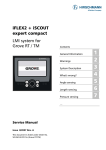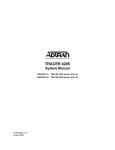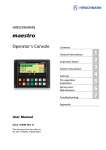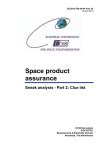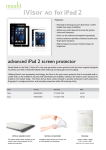Download MentorNational - crane lmi systems
Transcript
iVISOR mentor QVGA for National Contents General information Important notes Service menus Troubleshooting Appendix Service Manual Edition 5/2011 Rev. D The order code for this document is 24 183 69 1001e_Rev D (National) TABLE OF CONTENTS 1. General information ........................................................................... 3 2. Important notes .................................................................................. 5 3. Sensor calibration .............................................................................. 6 3.1 Zero-setting the pressure signals......................................................... 8 3.2 Zero-setting the slewing signal........................................................... 10 3.3 Length sensor calibration procedure.................................................. 12 3.4 Angle sensor calibration procedure.................................................... 15 4. Spare Part Listings .......................................................................... 18 4.1 Central Unit / Console ........................................................................ 18 4.2 Pressure Transducer Block................................................................ 19 4.3 Sensor, LWG508/13........................................................................... 20 4.4 A2B Spare Parts................................................................................. 21 5. Troubleshooting .............................................................................. 23 5.1 General information........................................................................... 23 5.2 Error code list .................................................................................... 24 Revision History ................................................................................ 29 The manufacturer reserves the right to modify the contents of this manual without notice. Hirschmann will not be liable for errors contained in this manual or for incidental or consequential damages in connection with the furnishing, performance, or use of this manual. This document contains proprietary information, which is protected by copyright, and all rights are reserved. No part of this document may be photocopied, reproduced, or translated to another language without the prior written consent of Hirschmann. Hirschmann reserves proprietary rights to all drawings, photos and the data contained therein. The drawings, photos and data are confidential and cannot be used or reproduced without the written consent of Hirschmann. The drawings and/or photos are subject to technical modification without prior notice. All information in this document is subject to change without notice. © 2009 Hirschmann Automation and Control GmbH · Branch Office Ettlingen · eMail: [email protected] · www.hirschmann.com 24 183 69 1001e_Rev D (National, Service).doc / 2009-05-05 / Rev. D / KE, KG. 2 Configuration Setup 1. GENERAL INFORMATION This manual describes the service menus of the iVISOR mentor QVGA safe load indicator (SLI) and assists a service or maintenance person in identifying system malfunctions for National Cranes. NOTE: Knowledge of system and CAN bus wiring is assumed. REFERENCE: Refer to Operator’s manual 24 183 19 1001e_Rev B (National) for detailed operation of the mentor QVGA. The iVISOR mentor QVGA safe load indicator system for National Cranes comprises a central microprocessor unit with an integrated display and control console together with various sensors to record the measured values. The system components are connected via CAN bus. Components of the iVISOR mentor QVGA SLI system (without optional extras) © 2009 Hirschmann Automation and Control GmbH · Branch Office Ettlingen · eMail: [email protected] · www.hirschmann.com 24 183 69 1001e_Rev D (National, Service).doc / 2009-05-05 / Rev. D / KE, KG. 3 Configuration Setup Components: CPU/Console: The iVISOR mentor QVGA safe load indicator comprises a central microprocessor unit with an integrated display and operating console together with various sensors to record measured values. The system components are connected via CAN bus. The iVISOR mentor QVGA displays all geometrical information such as length and angle of main boom, working radius and tip height of the boom. It also displays the actual load and the maximum load permitted by load chart. Furthermore, it has an acoustical alarm, a warning light for overload, and a pre-warning light. The graphic display allows for a simple interactive configuration setup, as well as sensor calibration (zero adjustment), and troubleshooting sensor output screen. The console has a warning light for anti-two-block conditions and an override switch for overload or antiblock condition. Length-Angle Transducer: The length-angle sensor gSENS LWG, often referred to as the “cable reel”, is a combination of two transducers in one box, installed on the base section of the boom. It measures the length and the angle of the boom. A reeling drum drives a potentiometer, which is the length transducer. Part of the length transducer circuit is the length cable on the drum, which is a multi-conductor cable. It is connected to the anti-two-block switch at the boom head and to a slip ring body in the LWG. The angle transducer is a potentiometer driven by a weighted pendulum that is oil damped. Both length and angle transducer are connected to a CAN bus controller board, which is connected to the bus system. Pressure Transducer(s): A pressure transducer pSENS DAVS converts hydraulic pressure into a CAN signal. One (or two) pressure transducer is (are) connected to the piston side of the lift cylinder and one to the rod side. © 2009 Hirschmann Automation and Control GmbH · Branch Office Ettlingen · eMail: [email protected] · www.hirschmann.com 24 183 69 1001e_Rev D (National, Service).doc / 2009-05-05 / Rev. D / KE, KG. 4 Configuration Setup 2. IMPORTANT NOTES The SLI is an operating aid that warns the crane operator of imminent overloading or of the approach of the hook block to the boom head, in order to avoid possible property damage or injury to personnel. The device is not, nor is it intended to be, a substitute for good operator judgment and/or experience, nor does it remove the need for utilizing only recognized safe procedures during crane operations. The crane operator continues to bear ultimate responsibility for safe operation of the crane. He must ensure that he fully understands and follows the displayed notes and instructions in their entirety. The SLI is not able to provide aid to the crane operator unless it has been properly adjusted and unless the correct load capacity chart and the correct operating code have been entered for the respective rigging configuration. The correctness of the SLI settings must be guaranteed before beginning crane work in order to avoid damage to property and severe or even fatal injuries to personnel. This system can be equipped with an external key-operated switch located in the crane operator's cab. This key-operated switch overrides control lever function switch-off by the SLI or by the hoist limit switch system. This switch may only be used during emergency situations, and even then only by authorized personnel. Failure to observe these instructions could result in damage to property and severe or even fatal injuries to personnel. The SLI cannot perform correctly unless it has been properly adjusted. The prerequisite for this is making conscientious and correct entries during the set-up procedure, in accordance with the actual configuration of the crane. The correctness of the SLI settings must be ensured before beginning crane work in order to avoid damage to property and severe or even fatal injuries to personnel. © 2009 Hirschmann Automation and Control GmbH · Branch Office Ettlingen · eMail: [email protected] · www.hirschmann.com 24 183 69 1001e_Rev D (National, Service).doc / 2009-05-05 / Rev. D / KE, KG. 5 Sensor Calibration 3. Sensor Calibration In this code-protected area, settings affecting system precision can be made by trained service personnel. For access to the calibration menus it is necessary to input a matching 5-digit code. To start the function: Actuate the INFO key. ▼ Info screen to service menus back ▼ Entry to calibration menus abort input of service code increase marked numeric value reduce marked numeric value mark the next figure, access after the last valid figure If an invalid service code is entered, you are prompted to enter it again or to abort the input. © 2009 Hirschmann Automation and Control GmbH · Branch Office Ettlingen · eMail: [email protected] · www.hirschmann.com 24 183 69 1001e_Rev D (National, Service).doc / 2009-05-05 / Rev. D / KE, KG. 6 Sensor Calibration After entering the service menu you can follow the calibration procedure step by step or can select . Press "ESC" to finish calibration procedure: the type of calibration by scrolling with function key 3.1) pressure signal piston side … and rod side 3.2) slewing angle signal 3.3) boom length signal 3.4) boom angle signal © 2009 Hirschmann Automation and Control GmbH · Branch Office Ettlingen · eMail: [email protected] · www.hirschmann.com 24 183 69 1001e_Rev D (National, Service).doc / 2009-05-05 / Rev. D / KE, KG. 7 Sensor Calibration 3.1 Zero-setting the pressure signals NOTE: The only thing adjustable for the pressure transducers is the zero point, which is the signal the transducer outputs when there is no (zero) pressure sensed. Ensure there is no pressure in the hydraulic line when disconnecting the hoses from pressure transducers! The display shows which transducer (piston-side, rod-side or force) is being zeroed and a horizontal dial marks the present pressure (or force) difference in %. NOTE: there are two calibration screens: for piston and for rod transducer. NOTE: The operating range for zero-setting this value is from -1% to +1%. Press and release the “AUTO >CAL<” key multiple times until the zero-setting starts. The indicator line must move to zero on the dial, otherwise the zero-setting of this value is not correct! ▼ Zero point adjustment, pressure piston side: leave the service menu carry out zero point setting skip calibration step / go to next menu © 2009 Hirschmann Automation and Control GmbH · Branch Office Ettlingen · eMail: [email protected] · www.hirschmann.com 24 183 69 1001e_Rev D (National, Service).doc / 2009-05-05 / Rev. D / KE, KG. 8 Sensor Calibration ▼ Zero point adjustment, pressure rod side: leave the service menu carry out zero point setting skip calibration step / go to next menu © 2009 Hirschmann Automation and Control GmbH · Branch Office Ettlingen · eMail: [email protected] · www.hirschmann.com 24 183 69 1001e_Rev D (National, Service).doc / 2009-05-05 / Rev. D / KE, KG. 9 Sensor Calibration 3.2 Zero-setting the slewing signal NOTE: The only thing adjustable for the slew potentiometer is the zero point, which is complete when the boom is at the 0 and 180° position of the crane. NOTE: The range for zero-setting this value is from -10° to +10°./ ±170° to 190° Press the “AUTO >CAL<” key until the zero-setting starts. The indicator line must move to zero on the dial, otherwise the zero-setting of this value is not correct! ▼ Zero point setting, slewing angle 0° position: leave the service menu carry out zero point setting slewing angle for 0° position skip calibration step / go to next menu ▼ Zero point setting, slewing angle 180° position: leave the service menu carry out zero point setting slewing angle for 180° position skip calibration step / go to next menu © 2009 Hirschmann Automation and Control GmbH · Branch Office Ettlingen · eMail: [email protected] · www.hirschmann.com 24 183 69 1001e_Rev D (National, Service).doc / 2009-05-05 / Rev. D / KE, KG. 10 Sensor Calibration 3.3 Length sensor calibration procedure NOTE: The length sensor can be calibrated for its zero point and its full range. With retracted boom, the potentiometer of the length sensor has to be at its 0 position, which is all the way counter-clockwise. For extended boom, the adjustment is done by software as described below. The length should be calibrated to be about 0.1 feet (or 0.05m for metric) accurate for retracted and extended lengths. Perform the following steps: ▼ Start screen zero point adjustment, boom length: leave the service menu Start length calibration ▼ Start screen min. boom length: leave the service menu skip calibration step / go to next menu Fully retract the main boom and check if indicated length is within 0.1 feet (or 0.05m for metric) of actual retracted boom length. If it is not, adjust length potentiometer mechanically as described below: © 2009 Hirschmann Automation and Control GmbH · Branch Office Ettlingen · eMail: [email protected] · www.hirschmann.com 24 183 69 1001e_Rev D (National, Service).doc / 2009-05-05 / Rev. D / KE, KG. 11 Sensor Calibration With boom fully retracted turn the center screw of the length pot unit counter clockwise to a soft stop. During adjustment an additional button "OK" appears. Check value and set actual length as fully retracted length by pressing OK. ▼ Adjustment, min length: leave the service menu carry out min. boom length setting skip calibration step / go to next menu Afterward next calibration screen appears: © 2009 Hirschmann Automation and Control GmbH · Branch Office Ettlingen · eMail: [email protected] · www.hirschmann.com 24 183 69 1001e_Rev D (National, Service).doc / 2009-05-05 / Rev. D / KE, KG. 12 Sensor Calibration ▼ Start screen maximum. boom length: leave the service menu skip calibration step / go to next menu Now extend main boom all the way out. Make sure you are within the allowed operating range (especially maximum radius). During telescoping out the boom an additional button "OK" appears. ▼ Adjustment, maximum length: leave the service menu carry out max. boom length setting skip calibration step / go to next menu Check whether boom is fully extended, then press "OK". Afterward next calibration step (angle) appears. © 2009 Hirschmann Automation and Control GmbH · Branch Office Ettlingen · eMail: [email protected] · www.hirschmann.com 24 183 69 1001e_Rev D (National, Service).doc / 2009-05-05 / Rev. D / KE, KG. 13 Sensor Calibration 3.4 Angle sensor calibration procedure The angle sensor can be calibrated for its zero point, with steep boom (75°) and one or two additional angle values (40° / 65°) Material required: calibrated inclinometer ▼ Start screen adjustment, boom angle: leave the service menu Start angle calibration procedure ▼ Start calibration for "zero degree" angle: leave the service menu skip calibration step / go to next menu © 2009 Hirschmann Automation and Control GmbH · Branch Office Ettlingen · eMail: [email protected] · www.hirschmann.com 24 183 69 1001e_Rev D (National, Service).doc / 2009-05-05 / Rev. D / KE, KG. 14 Sensor Calibration Boom down. Release adjustment screws of the angle sensor. Mechanically adjust top of angle sensor housing exact parallel with boom by help of inclinometer. Fix adjustment screws of the angle sensor. WG Having adjusted the angle sensor, mechanically check value and press "OK" for the next step. ▼ Calibration for "zero degree" angle: leave the service menu calibrate next angle skip calibration step / go to next menu Now boom up to 40°, (range is 35°- 45°) ▼ Calibration for "40°" angle: leave the service menu calibrate next angle skip calibration step / go to next menu © 2009 Hirschmann Automation and Control GmbH · Branch Office Ettlingen · eMail: [email protected] · www.hirschmann.com 24 183 69 1001e_Rev D (National, Service).doc / 2009-05-05 / Rev. D / KE, KG. 15 Sensor Calibration When the boom angle is within the calibration range, the screen will add the ‘CHANGE ?’ / ‘SET’ and ‘OK’ text as shown below: ▼ Calibration for "40°" angle: leave the service menu adjust actual angle set current angle to defined angle Measure the boom angle with the inclinometer and when the boom is positioned in the calibration range, compare the measured angle to the displayed angle. If the indicated angle is within +/- 0.1 degrees of the measured angle, confirm with ‘OK’. Otherwise, select ‘SET’ to adjust the angle. ▼ Adjust "40°" angle: leave the service menu increase angle value by 0.1° Confirm decrease angle value by 0.1° Once you push ‘SET’, the screen is going to change to the angle adjustment screen. Use the ‘+’ and ‘-‘buttons to adjust the indicated angle to match the measured angle. When the display shows the correct angle, press ‘OK’. Press ESC to leave sensor adjustments and return to normal LMI screen. Now repeat procedure as shown for the boom angle 65° and 75°. If values were modified a confirmation screen appears at the end: © 2009 Hirschmann Automation and Control GmbH · Branch Office Ettlingen · eMail: [email protected] · www.hirschmann.com 24 183 69 1001e_Rev D (National, Service).doc / 2009-05-05 / Rev. D / KE, KG. 16 Sensor Calibration ▼ Confirmation screen leave the service menu YES, I confirm NO, go to next menu When you are sure to save this calibration, press ‘OK’. Normal LMI screen appears. Otherwise press "Return" for restart the calibration procedure Press ESC to leave sensor adjustments and return to normal LMI screen. © 2009 Hirschmann Automation and Control GmbH · Branch Office Ettlingen · eMail: [email protected] · www.hirschmann.com 24 183 69 1001e_Rev D (National, Service).doc / 2009-05-05 / Rev. D / KE, KG. 17 Sensor Calibration 4. Spare Part Listings 4.1 Central Unit / Console iVISOR Mentor QVGA / 1001 PART NO. 024-183-061-001 8 11 1 13 4 2 10 3 5 6 NO. 1 1 2 3 4 5 6 7* 8 9* 10 11 12* 13 PART NO. 024-183-100-010 024-183-100-201 050-000-100-298 024-183-100-009 024-183-050-007 024-183-290-002 024-000-100-095 202-10-0003 024-183-300-005 024-050-300-117 301-11-1042 024-183-300-004 313-10-2001 024-183-301-001 SAP NO. 534626 534586 534603 534589 534590 534170 524167 325577 534199 532477 324626 535243 306503 534617 QTY 1 1 1 1 1 1 1 1 1 1 1 1 1 1 DESCRIPTION FRONT PANEL, MENTOR QVGA w/DISPLAY FRONT PANEL, 1001 SQ183 kpl. HIRSCHMANN LCD, UNIT HOUSING, 0009 MENTOR QVGA FLAT SEAL PIEZO-TRANSMITTER CPT 45A PRESSURE COMP. ELEMENT 0095 cpl. PRESSURE COMP. ELEMENT SELF ADHESIVE REAL TIME CLOCK SQ183 EVENT RECORDER BATTERY MODULE EVENT RECORDER PROTECTIOON CAP D-SUB CONN. 9P MAIN BOARD 0004 MENTOR QVGA ATO MINI FUSE 2A (SAE J 2077) ADAPTER BOARD 1001 MENTOR QVGA * Not shown © 2009 Hirschmann Automation and Control GmbH · Branch Office Ettlingen · eMail: [email protected] · www.hirschmann.com 24 183 69 1001e_Rev D (National, Service).doc / 2009-05-05 / Rev. D / KE, KG. 18 Sensor Calibration 4.2 Pressure Transducer Block, DAV314/0014 PART NO. 044-314-060-014 Piston Side Rod Side Cutting ring for pressure transducers PART NO. 000-209-140-016 Hydraulic bulkhead adapter 9/16-18 JIC 37° x 16m x 1.5 PART NO. 000-214-600-093 CAN bus from pressure transducer to cable reel. PART NO. 031-300-060-454 © 2009 Hirschmann Automation and Control GmbH · Branch Office Ettlingen · eMail: [email protected] · www.hirschmann.com 24 183 69 1001e_Rev D (National, Service).doc / 2009-05-05 / Rev. D / KE, KG. 19 Sensor Calibration 4.3 SENSOR, LWG508/13 W/ 60M 151 ANGLE, 037 LENGTH 9 1 8 7 2 6 5 4 # Part # SAP # Qty 1 2 3* 4 5 6 7 8 9 10* 064-360-061-551 068-000-110-133 000-673-020-002 325149 092-000-060-387 067-000-300-013 067-000-050-126 068-000-300-104 068-000-110-107 005-682-000-001 606700 530333 311033 325149 529959 531527 534466 534340 518748 518697 1 1 197’ 1 1 1 1 1 1 1 Description Sensor, Angle, WGC360/1551 Cable Reel Housing, W/Cable Drum & Springs Cable, Length Senor, 1 Core W/Shield Connector, Female, M12 W/Cable Connector, Male, M12 W/Cable Length Pot, W/Cable & Plug Gear Wheel, T=96 Board, Connection Kit, Slip Ring, 2 Conductor Cable Reel Cover W/Gasket © 2009 Hirschmann Automation and Control GmbH · Branch Office Ettlingen · eMail: [email protected] · www.hirschmann.com 24 183 69 1001e_Rev D (National, Service).doc / 2009-05-05 / Rev. D / KE, KG. 20 Sensor Calibration 4.4 A2B Spare Parts 031-300-050-276 A2B Mounting standoff 031-300-050-264 A2B mounting plate 003-100-210-012 Weight and chain 031-300-100-037 Chain connector, quick link 031-300-050-272 Lynch pin 031-300-060-377 Cable Assembly 12’ Note: part number may change depending on length. © 2009 Hirschmann Automation and Control GmbH · Branch Office Ettlingen · eMail: [email protected] · www.hirschmann.com 24 183 69 1001e_Rev D (National, Service).doc / 2009-05-05 / Rev. D / KE, KG. 21 Troubleshooting 5. TROUBLESHOOTING 5.1 General information In the event of a malfunction, if the range is not reached or is exceeded or if an operating error is detected by the system, a message appears on the data display (1) starting with an “E” followed by a two-digit code which indicates the reason for the malfunction. The error codes listed in the following table describe the various error codes which can be displayed in this system. Faults in the microprocessor system must be dealt with only by the manufacturer’s trained customer service personnel. If faults occur, please contact Hirschmann Service USA: www.hirschmann.com > USA > Electronic Control Systems > Contact - ECS. © 2009 Hirschmann Automation and Control GmbH · Branch Office Ettlingen · eMail: [email protected] · www.hirschmann.com 24 183 69 1001e_Rev D (National, Service).doc / 2009-05-05 / Rev. D / KE, KG. 22 Error Code List 5.2 Error code list (System program LSQN V 1.xx) Error Code Error E01 Fallen below radius range or angle range exceeded E02 Radius range exceeded or fallen below angle range E03 Non-permitted slewing zone (no load area) E04 Operating mode not acknowledged or non permitted slewing zone Cause E06 Set the correct operating mode for the operating state in question The boom is in a non-permitted slewing zone Boom has been extended either too far or not far enough, e.g. if it is prohibited to go beyond a certain maximum boom length or with load curves for jibs where the main boom has to be extended to a certain length Length sensor adjustment has changed, e.g. the cable slid off the length sensor reel. Luff up the boom to a radius or angle specified in the load chart. Slew to permitted area Slew the boom to a permitted area. Extend/retract boom to the correct length Retract boom. Check the prestress of the cable reel (cable must be taut). Open the length sensor and carefully turn the length sensor pot counterclockwise until the detent by means of a screw driver Replace the complete clutch including drive wheel and adjust length sensor pot as described above Luff the jib to a radius or angle specified in the load chart. Clutch between length sensor pot and drive is defective Maximum radius as specified in the load chart exceeded or fallen below minimum angle due to luffing down the luffing jib too far Length potentiometer is defective PDB variable for analog value not supported Replace length potentiometer Setup of correct PDB variable for analog value in DGA6.i.3 Electronic component in the measuring channel is defective Replace sensor unit E11 Prohibited length range Fallen below lower limit value for measuring channel "length main boom" Luff down the boom to a radius or angle specified in the load chart. A non existing operating mode has been selected Radius range exceeded or fallen below angle range with luffing jib operation Fallen below the minimum radius or gone past the maximum angle specified in the respective load chart due to luffing up the boom too far Gone past the maximum radius or fallen below the minimum angle specified in the respective load chart due to luffing down the boom too far The slewing zone with load is not permitted E05 Elimination © 2009 Hirschmann Automation and Control GmbH · Branch Office Ettlingen · eMail: [email protected] · www.hirschmann.com 24 183 69 1001e_Rev D (National, Service).doc / 2009-05-05 / Rev. D / KE, KG. 23 Error Code List Error Code E12 E13 E14 E15 E16 E17 E18 E1A Error Fallen below the lower limit value in the measuring channel "pressure piston side" Fallen below lower limit value in the measuring channel "pressure rod side" Fallen below lower limit value in measuring channel "force" Fallen below lower limit value in measuring channel "angle main boom" Fallen below lower limit value in measuring channel "angle 2" Cause Fallen below lower limit value in measuring channel "slewing angle 1". slew below allowed range E1B E1C Fallen below lower limit Replace pressure transducer Setup of correct PDB variable for analog value in DGA6.i.3 Replace sensor unit Force transducer defective Electronic component in the measuring channel is defective. Replace force transducer Replace sensor unit Angle potentiometer defective PDB variable for analog value not supported Replace angle sensor Setup of correct PDB variable for analog value in DGA6.i.3 Electronic component in the measuring channel defective. Angle potentiometer defective Electronic component in the measuring channel defective. Replace sensor unit Replace angle sensor Replace sensor unit Length potentiometer defective Electronic component in the measuring channel defective Replace length sensor. Replace sensor unit Front outrigger overloaded Cable between the central unit and the slewing angle sensor defective or loose. Water inside the plug of the angle sensor Check cable as well as plugs, replace, if need be. move to allowed slew range Replace slewing angle sensor Replace sensor unit 1-cannel slew sensor min. value DGA 11.5.7 <> 0 Slewing angle potentiometer is defective Electronic component in the measuring channel defective refer to E1A refer to E1A Angle potentiometer defective Replace angle sensor Fallen below lower limit value in measuring channel "slewing angle 2" Elimination Electronic component in the measuring channel is defective. refer to E12 Fallen below lower limit value "length telescope I (+II)" Front outrigger overloaded Pressure transducer is defective. PDB variable for analog value not supported refer to E12 © 2009 Hirschmann Automation and Control GmbH · Branch Office Ettlingen · eMail: [email protected] · www.hirschmann.com 24 183 69 1001e_Rev D (National, Service).doc / 2009-05-05 / Rev. D / KE, KG. 24 Error Code List Error Code E21 E22 E23 E24 E25 E26 E27 E2A Error E2C E31 Elimination value in measuring channel "luffing jib angle" Upper limit value in measuring channel "main boom length" has been exceeded. Upper limit value in measuring channel "pressure piston side" has been exceeded Upper limit value in measuring channel "pressure rod side" has been exceeded. Upper limit value in measuring channel "force" has been exceeded. Upper limit value in measuring channel "main boom angle" has been exceeded. Upper limit value in measuring channel "angle 2" has been exceeded. Upper limit value in measuring channel "length telescope I (+II) has been exceeded. Electronic component in the measuring channel defective. Replace sensor unit refer to E11 refer to E11 refer to E12 refer to E12 refer to E12 refer to E12 refer to E14 refer to E14 refer to E15 refer to E15 refer to E16 refer to E16 refer to E17 refer to E17 Upper limit value in measuring channel "slewing angle 1" has been exceeded refer to E1A refer to E1A 1-cannel slew sensor max. value DGA 11.5.8 <> 0 move to allowed slew range refer to E1A refer to E1A Angle potentiometer defective Replace angle sensor Electronic component in the measuring channel defective. Replace sensor unit The system program file is defective. Flash-EPROM defective Upload valid system software slew above allowed range E2B Cause Upper limit value in measuring channel "slewing angle 2" has been exceeded Upper limit value in measuring channel "luffing jib angle" has been exceeded Error in the system program Replace central unit © 2009 Hirschmann Automation and Control GmbH · Branch Office Ettlingen · eMail: [email protected] · www.hirschmann.com 24 183 69 1001e_Rev D (National, Service).doc / 2009-05-05 / Rev. D / KE, KG. 25 Error Code List Error Code E32 Error Error in the power supply Cause +UB System not present at the system start +UB System not present at the system finish Contact problems at +UB switch off/on System program file is defective E37 E38 E39 E43 E47 E51 E52 E53 E56 E57 E61 Error in the logical program flow System program and crane data file do not match. System program and load chart file do not match Error in the write/read memory, (RAM) Error in the monitored write/ read memory. Flash-EPROM defective The system program in the SLI does not match to the programming in the crane data file The system program in the SLI and the programming in the load chart file do not match. Elimination +UB System and +UB Power must be wired separately: +UB System connected direct with the crane battery. +UB Power for switch on/off +UB switch off/on again Upload valid system software Replace central unit Upload valid system program file or the valid crane data file Upload valid system program file or the valid load chart file Write/read memory (RAM) or central unit defective. Replace central unit The CRC sign of the monitored write/read memory is wrong Restart the SLI The CRC verification of the monitored write/read memory provides an incoherent result Error in the crane data file Error in load chart file. Wrong setup of min. analog inputs length1, angle1, pressure1 Error in crane data file. The buffer battery is needs recharged (< 2V at 1kOhm). Replace buffer battery on the central unit. Central unit defective. Replace central unit No valid data in the crane data file. Upload valid crane data file Flash-EPROM defective No valid data in the load chart file Flash-EPROM defective Analog input not supported Replace central unit Upload valid load chart file Replace central unit Setup correct Flag in DGA 6.i.2 No valid data in the crane data file during calibration. Restore or upload valid crane data file Flash-EPROM defective Calibration data file does not contain valid data. Flash-EPROM defective CAN Bus cable between the central unit and the sensor unit defective or not connected. Can bus port in the central unit defective Replace central unit Upload calibration data file by changing data (OM, limits) and save Replace central unit Check the connection between the central unit and the sensor units Replace the central unit Error in serial crane data file. Error in the CAN bus data transfer for all CAN units © 2009 Hirschmann Automation and Control GmbH · Branch Office Ettlingen · eMail: [email protected] · www.hirschmann.com 24 183 69 1001e_Rev D (National, Service).doc / 2009-05-05 / Rev. D / KE, KG. 26 Error Code List Error Code Error Cause E62 E63 E64 E65 E66 E67 E68 E69 E84 Error in the can bus data transfer of the pressure transducer sensor unit Error in the can bus pressure transducer sensor unit Error in the can bus data transfer of the length/angle sensor unit Error in the can bus length/angle sensor unit Error in the data of the digital I/O MENTOR Error in the can bus data transfer of the digital I/O external module Error in the can bus data transfer of the force sensor unit Error in the can bus force sensor unit Error in the radius determination E89 Operating mode switchover with load. EAB EAC Check the cable to the sensor unit Replace the central unit Replace the sensor unit Replace the sensor unit Replace the sensor unit See E62 See E63 See E63 PDB variable invalid Change system software Change MENTOR PDB variable invalid Connect digital I/O external CAN module See E62 See E62 See E63 See E63 The selected rigging condition is not contained in the crane data file. Select another rigging condition The computed radius is too small (negative deflection) Check the programming in the crane data file. Check the programming in the crane data file. The operating mode on the console has been switched over with the boom loaded. SLI processing time limit exceeded A2B switch circuit disconnected (not with radio A2B) Replace Can Bus cable See E62 SLI watchdog activated Short circuit in the A2B switch circuit (not with radio A2B) Elimination Wrong rigging condition. E85 E98 Short circuit in a CAN Bus cable Cable between the central unit and the sensor unit defective. Can bus port in the central unit defective Can bus port in the sensor unit is defective Sensor unit is defective The analog values of the sensor unit are invalid Short circuit in the A2B switch Short circuit in the cable to the A2B switch Disconnected cable in the A2B switch Disconnected cable to the A2B switch Select operating mode without load on the boom Reset system Connect PC terminal and watch error messages Replace A2B switch Replace cable to the A2B switch Connect or replace cable in the A2B switch Connect or replace cable to the A2B switch © 2009 Hirschmann Automation and Control GmbH · Branch Office Ettlingen · eMail: [email protected] · www.hirschmann.com 24 183 69 1001e_Rev D (National, Service).doc / 2009-05-05 / Rev. D / KE, KG. 27 Error Code List Error Code EAD Error No valid A2B switch status EDB Datalogger setup error EDC Datalogger watchdog activated EDD EDE EDF EFD Battery empty Record lost Flash block full SLI Watchdog extra time Cause Elimination Sensor wrong function Replace A2B switch CAN bus delay Replace cable to the A2B switch Radio telegram delay module (radio A2B) Replace battery of radio module (radio A2B) Radio telegram ID is invalid Setup ID in DGA12.9 Setup of the datalogger is cleared (ser. crane data file or battery buffered RAM) transfer data and setup datalogger again datalogger processing time limit exceeded Battery check detected a low voltage of the battery Not possible to save data because other task saves data at the same time Not possible to save any more data Message disappears after a few seconds Message disappears after a few seconds a function needs more than 0.5 sec, e.g. Flash PROM write Message disappears after a few seconds Reset system Connect PC terminal and watch error messages change batteries, after this setup of RTC NOTE: If an error message not included in the above list is displayed, please contact Hirschmann Service USA: www.hirschmann.com > USA > Electronic Control Systems > Contact - ECS. © 2009 Hirschmann Automation and Control GmbH · Branch Office Ettlingen · eMail: [email protected] · www.hirschmann.com 24 183 69 1001e_Rev D (National, Service).doc / 2009-05-05 / Rev. D / KE, KG. 28 Revision History Rev. Rev. A Rev. B Rev. C Rev. D Date Changes 2008-07-11 First edition for National 1300H System software SQG2 V d3.09 SLI software LSQN V 1.xx Graphics National V 1.04 Application National MQVGA V 1.04 (20080619) 2009-05-05 Revision B for National Cranes modified menu graphics, layout correction System software SQG2 V 3.14 SLI software LSQN V 1.12 Graphics National V 1.05 (20081218) Application National MQVGA V 1.05 (20081218) 2009-07-02 Revision C for National Cranes Modified max. load description, SLI to LMI change Spare parts listings added 2011-08-10 Revision D Changed cable reel picture and parts list Made grammatical changes ECN 11-169 © 2009 Hirschmann Automation and Control GmbH · Branch Office Ettlingen · eMail: [email protected] · www.hirschmann.com 24 183 69 1001e_Rev D (National, Service).doc / 2009-05-05 / Rev. D / KE, KG. Name Konopka Konopka Ellis Gase 29





























